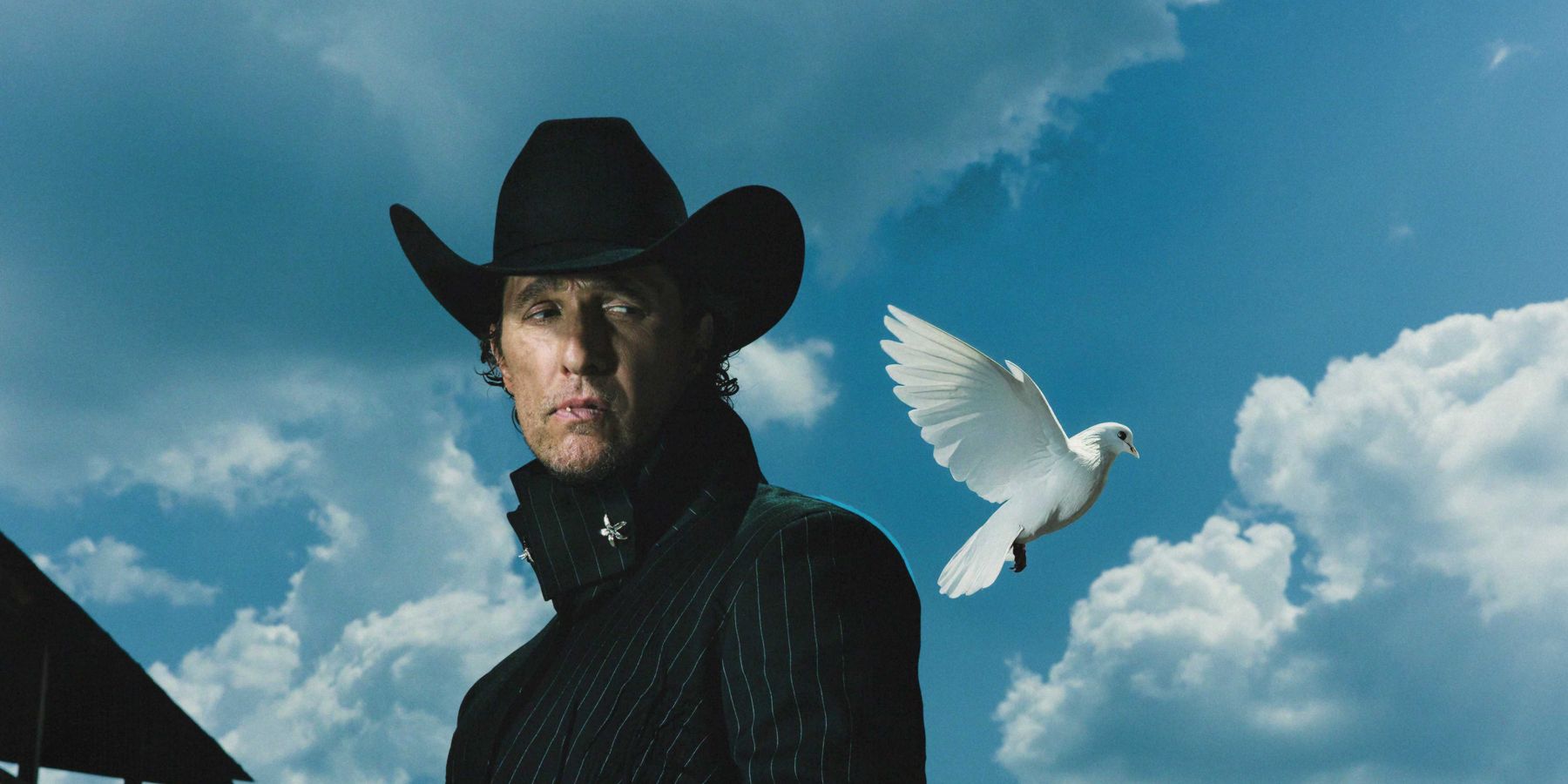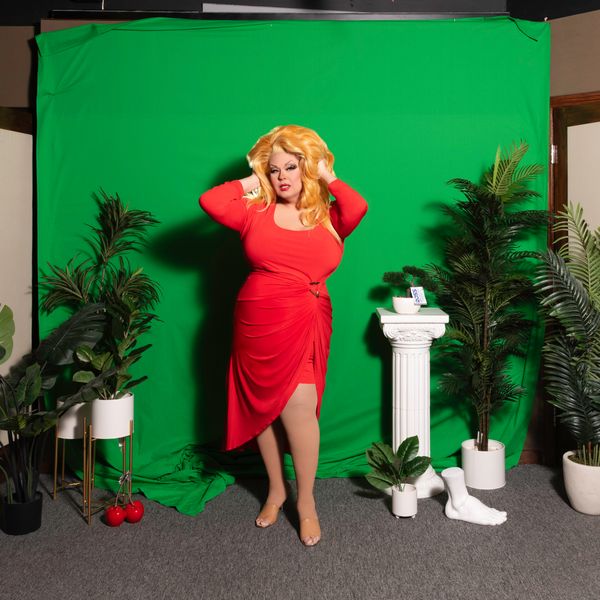
The Gospel According to Delta Work
Story by Joan Summers / Photography by Emily Monforte
Apr 11, 2024
Delta Work is reeling right now.
The iconic talk show hostess and Southern California drag legend just received news that the 99 Cents Only stores are closing. “I was just there yesterday, getting some randoms. Never thought anything about it,” she says. I mention a TikTok I’d seen about broom handles and broom heads sold separately being an omen of doom for the store. “I mean, can you believe it? 140,000 employees out of jobs; 30% off starting tomorrow. All stores closed by August.”
Were it anyone else, I’d steer the conversation back on track, but Delta’s rapturous fixation on the plight of the workers and customers has me utterly transfixed. I scratch at the surface of her seemingly intense reaction to the news, and she knocks me over for the first of many times in our conversation. “When I was a kid, and my mom was with my stepdad, there was a lot of strife, a lot of struggling, it was an emotional roller coaster,” Delta says. “We always had this place that we would go to, my mother and I, for lunch. It was called Muffin Break, and it was a little tiny cafe that did salads and muffins and that was it.” As the story goes, it was their safe space to be away from that strife, together, unencumbered by the reality of her childhood. Years later, when they’d move back to Los Angeles, they’d hit up Souplantation, which evoked similar feelings of nostalgia in young Delta. “When we went there, it was like no one knew we were there, we could talk about whatever, and no one knew what we were going through.”
When Souplantation abruptly shuttered, just like her favorite 99 Cent Only stores, it felt "like the place where we knew this comfort was gone,” Delta says. Listeners of her hit podcast, Very Delta, might remember the now-infamous soup-based establishment as “the one and only place where I publicly shit myself,” in Delta’s own words.
I mention, later in the interview, that it reminds me of the way she talks about fragrances as a source of comfort. Mugler has reformulated my own comfort scent, "Angel," over the years. It smells like bug spray to me now. Delta swoops in with an encyclopedic knowledge of perfumes to assist me with an alternative. “Confessions of a Rebel, the scent is called Get a Room and Order Champagne. It is very, very sexy.” As on the podcast, her advice is clear and often hilarious. I joke that it sounds like something the older dolls I used to run with would tell me to put behind my knees before a date. “Oh girl, they knew you were gonna be folded up in the backseat of a car.”
That she can bridge these distances, between Souplantation and scent memory and childhood pain and her expansive theory of everything, feels paradoxical at times. But spend any amount of time around her, and the many gravitational forces that tug the entire world into orbit around Delta Work come into sharp relief. She bristles at bad parking jobs, is the harshest critic a Subway sandwich artist might ever meet, and routinely dresses down obnoxious drag show attendees. Likewise, she is a fierce champion of her sisters and a person who cares quite deeply about the working conditions in her industry or elsewhere, however cloaked they might seem in petty observations about soda carbonation.
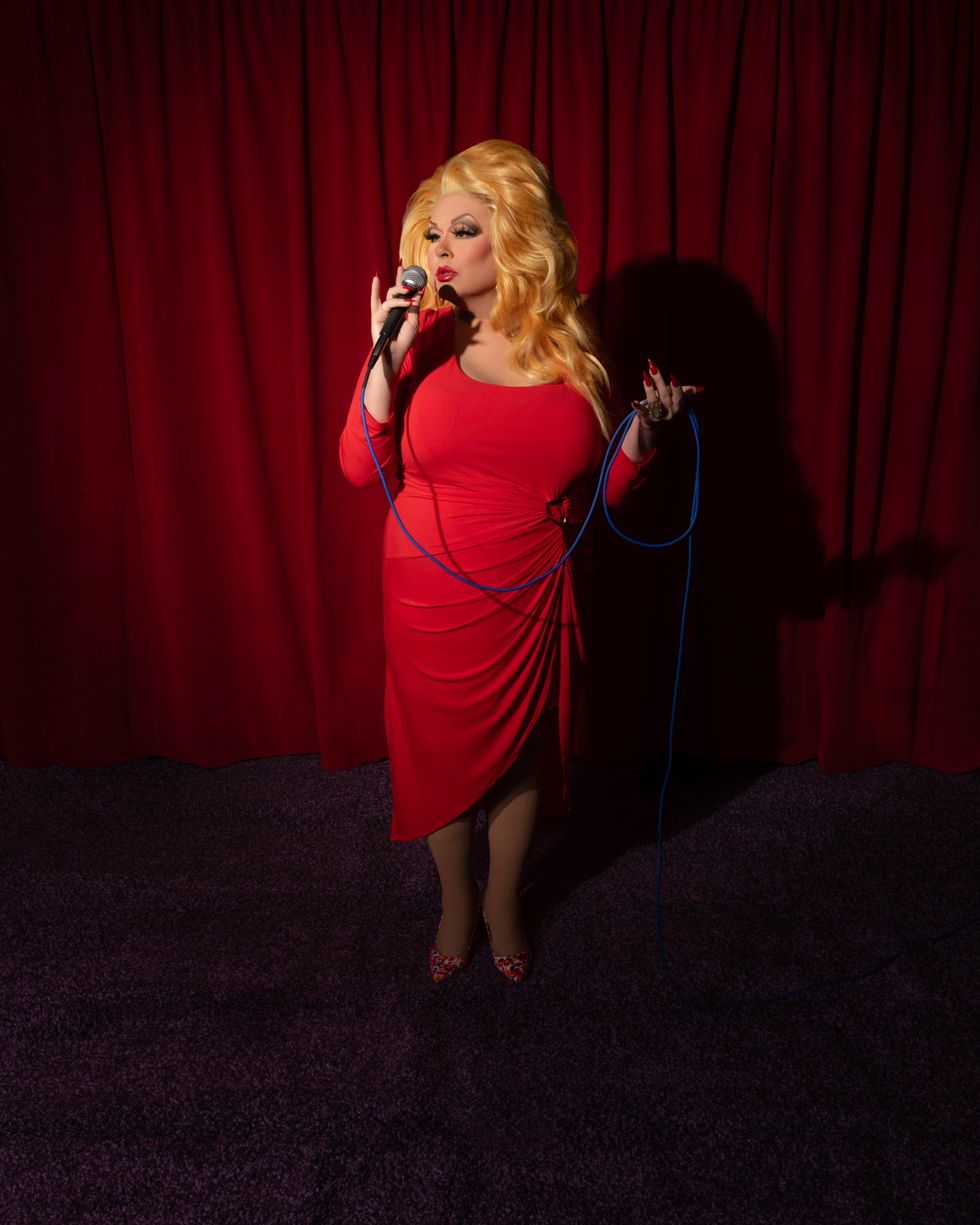
Before Very Delta, or the MOM Podcasts network of fellow drag queens that brought it to life, Delta sharpened her acrylics in the highly influential Los Angeles drag scene of the ‘90s and aughts. Named by chance after Delta Burke at a Designing Women drag show in the ‘90s, she hustled alongside fellow and future greats. Like Chad Michaels, Raja, Jasmine Masters and more, Delta was a former cast member of the legendary Dreamgirls Revue. There’s an old video of her, at Rage in 2013, doing what she calls the “God Warrior” dialogue spliced with Cher’s “Dark Lady” and Scandal’s “The Warrior.” The crowd erupts into a chorus of screams as she stands under the spotlight and rhythmically thumps her bible, mug stamped, prairie dress crumpled. It’s a “cerebral” performance, as she often describes her mixes for “the gays that come out on a Tuesday.”
Speaking of spotlights, the Long Beach Pride grand marshal was a regular at hotspots like Peanuts, or local haunts like Encounters, where she’d rub shoulders with RuPaul well before the supermodel of the world found her second chance at television success later in the decade. "[RuPaul] would wear these cowboy hats all the time, and there was a time she came in and was like, ‘You don't have a spotlight for your show.’” I beg Delta to tell me more. She continues: “We said we didn’t have anyone to operate it, and Ru said, ‘Buy me a beer and I’ll operate your spotlight.’ She had one of those near beers or something, not a real beer.” The admiration, for all the turbulence of the career to come, still shines through in the way Delta speaks of the supermodel, as she often refers to her former boss. “Her whole thing was like, everybody on stage needs to be properly showcased if you have that ability. I have that picture still to this day, from that particular night. There's only a handful of us that remember that.
On Drag Race, Delta found herself situated in a clique that would be known by fans and fellow contestants as the “Heathers” — Carmen Carrera, Manila Luzon, Delta Work and Raja, who’d go on to win their season. Like on her podcast, Delta was tough-talking, critical of her peers and a lip-sync maestro. Her performance to “Bad Romance” remains a favorite across iterations of the show; she’s critical of the space-themed outfit now, which she co-opted from her performances with the Dreamgirls, but I tell her it’s been vindicated by time and Drag Race scholars alike. She laughs, then offers more advice: “When I see contestants making really weird, sort of amateurish mistakes, I'm like, not to date myself, but you realize you have an Encyclopedia Britannica of mistakes that you can watch? Try not to be a Heather or a booger, because it's not going to fare well for you.”
Of that aforementioned turbulence: After some-odd years off the show, Delta was summoned at the last minute, as she describes it, to fill in for one of the supermodel’s aesthetic architects, Mathu Andersen. “I knew that Mathu created a wheel that anyone coming after was only going to keep clean. Nobody was recreating it,” Delta says. There’s a twinge of regret in her voice when I bring up Andersen — or a faint breeze drifting through an unclosed door, one she says might never fully shut. Despite winning an Emmy for Outstanding Hairstyling for a Multi-Camera Series or Special in 2018 — during which she thanked Andersen by name — Delta was abruptly cut off from access to the supermodel and her job. The legend goes that this fallout was over a disagreement about union membership, alongside disagreements about the work that were never plainly communicated to her. “I’m still left with this question of, why wouldn’t somebody just say, we hired you for our job, we are not happy artistically, we’re going in a different direction, that’s it, thank you so much for your time, goodbye. There was never that,” she says. The draft through that door intensifies. “Part of that world will always be with me. But it was a world where you start to second guess your loyalty, your brand, your reliability, your quality, your artistic vision, all those things.”
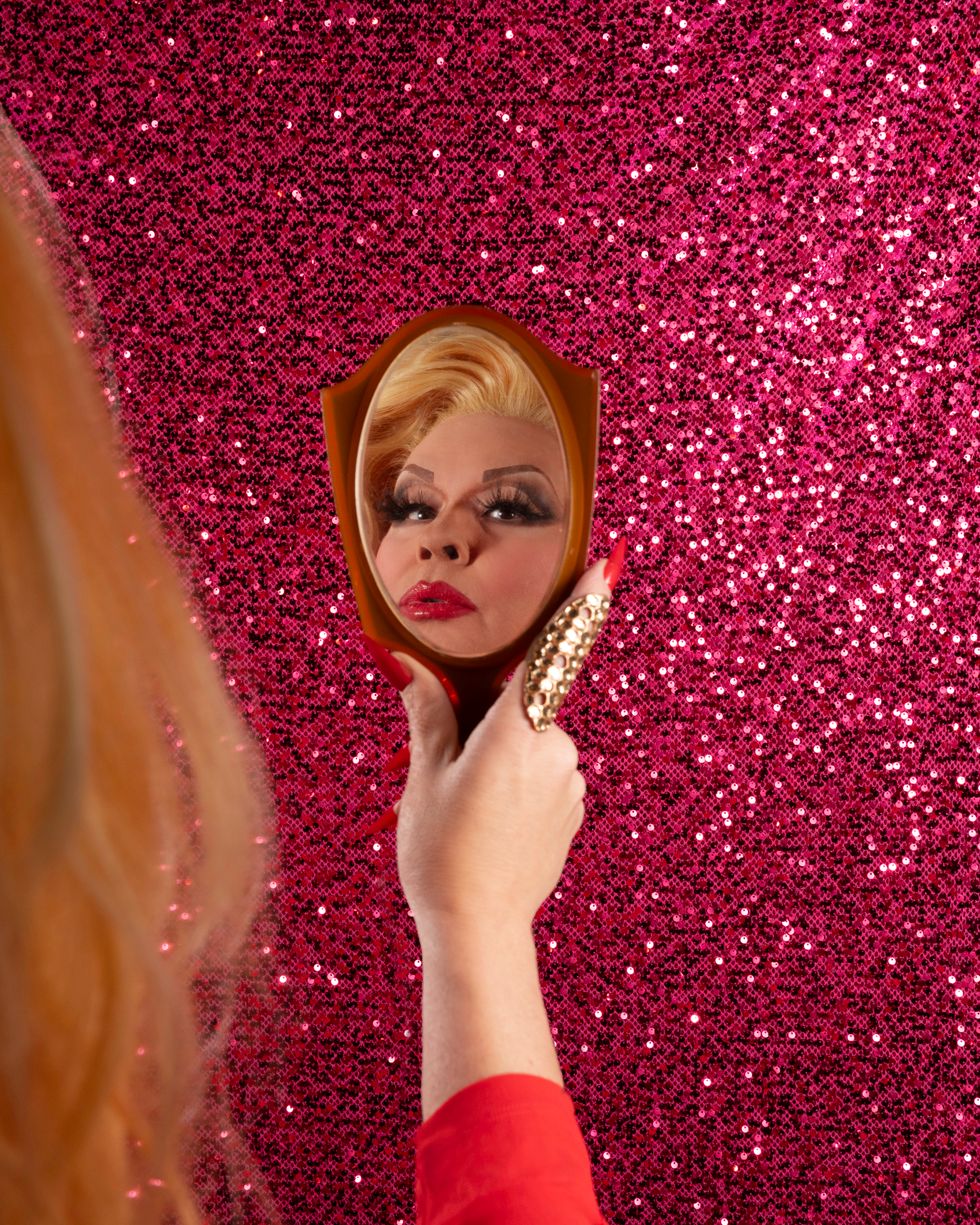
She likens this to the earliest part of her drag career, when she didn’t always feel like there was a place for her in the mix. “I've always been very effeminate. I remember I used to get full acrylic nails done. And my hair was long. In retrospect, that was my armor. I needed to have a way of showing people in advance: ‘This is who I am before you hear me talk. You have to see me like this.’” Her voice steels, just slightly. “If anybody had something negative to say to me, I thought I could shoulder it, too. It was my nails, it was my hair, because maybe I wasn't prepared for it to be me.”
Despite those scars, Delta Work has continued working, gaining a respect in her community that shines through in the conversations with guests on Very Delta. In that podcast, the ironic hand of fate has delivered her a platform to speak her mind. At last, she is unencumbered by the restrictions that came with working inside the World of Wonder machine — a machine many queens that followed her through the halls of Drag Race would also grind against the rails of, or seek to transform. Like her boss and friend, Willam.
It was within Race Chaser, Willam’s own podcast alongside drag royalty Alaska Thunderfuck, where Delta’s current trajectory first gained liftoff. In an interview with the two in 2019, Delta laid out what had happened with World of Wonder, in her own words. “They just sat back and let me talk. I remember after that, Alaska sent me a message, and she was like, 'I just want to apologize to you and let you know that I’m really sorry I didn’t seem conversational. I needed you to keep telling your story, and I didn’t want to interrupt you.'” Delta says Alaska didn’t need to “apologize for shit.” Conversely: “What she provided me was an actual release. I don’t believe I’ll ever get closure, but I did get a release.”
Fast forward to March 2024. Alaska Thunderfuck has just accepted Race Chaser’s Queerty Award for Best Podcast, one of several the show has won over the years. “The first thing Alaska said when she accepted the award was, ‘I wanted Delta to win this award. I voted every day for Delta to win this award. So I accept this award for Delta, because she’s my favorite podcast.’” She says that it came as a shock, since “some of those voices from a long time ago were also in that room,” and Alaska is, by Delta’s admission, “still on the good side of both.” The admiration is back in her voice, stronger this time. “It says something when people you admire, or people who offer you the opportunity, would say something like that when they really don’t have to. Nobody was waiting on that. I wasn’t waiting on that, because they rightfully got that award.”
Delta at first brushes off her accomplishments as luck when I ask. Or as having found herself in the right place at the right time, being the right queen for the job. “I'm still that person who picks up a penny off the ground, and all day long, I'll have good luck,” she says. Unsatisfied, I press her on why then, after the long arc of her career, does she think she finds herself in this renaissance of sorts? “I think maybe I wasn't prepared to hear my own voice. I think maybe I still was finding myself. I didn’t know what my point of view was.” She brings it back to the Souplantation, after the comfort was gone. “Maybe it's just my quirkiness, I don't know, I'm willing to accept all of it or never understand any of it, but I hid from certain parts of myself that I didn't understand, or wasn't vocal enough about.”
One door might never close, but she’s found another to open. Very Delta is a bona fide sensation and has quickly eclipsed all other conversation generators as the water cooler event in many queer people’s week. Born from Very That, which she co-hosted with longtime sister and frequent collaborator Raja, Very Delta is part gospel, part talk show, and wholly singular, just like the queen at its helm. Guests range from Drag Race hall-of-famers like Trixie Mattel to adult content creators like Sharok and local drag fixtures, like Delta’s close friend Jewels, who she credits with pioneering Los Angeles’ blockbuster drag brunch culture.
Like most scripture, though, the words are best heard directly from her own mouth. Read PAPER’s conversation with Delta Work below. (This interview has been edited and condensed for clarity.)
So, I’m going to do some homework with you right now, and read you something. Back in 2011, you’re talking to Hotspot Magazine. You tell them “I am starting to do some out of state touring from my normal 6 to 7 days a week of working in Southern California. I was just asked to Emcee the Bay Area Youth Alliance Seminar, with this year’s topic being bullying. I am very excited about that.” What comes to mind, looking back at that moment in your career 13 years ago?
Well, it was just right after Drag Race. We were catapulted into scurrying around, trying to figure out how to get booked. Are we going to be managed by this group, are we going to be managed by that group. All I knew at that time was that me and Raja had a friend who was managing other people, that did other things, and was like, “Hey, I can manage you.” I remember at that time, Mimi Imfirst reached out to me. She was like, “You know, we're going to need management, right?” She's like, “My friend, David, is going to manage me, and has this really cool idea that we go on this tour. I was like, oh, girl, who's your friend? I don't even know your friend. She's like, “No, his name is David Charpentier. And he's going to launch a group called PEG (Producer Entertainment Group.) And girl, I think he could really hook us up with work.’” I was like, I've never heard of that, that is not the tea. It's not going to work for me. Like, I'm going to go with my friend Diana. And I had wonderful, wonderful times with Diana, but at that time, there was no Producer Entertainment Group. And to look forward to now and be like, oh, girl, you could have been werking the world. You could have done so many other things. Who knows? Who knows!?
It’s interesting to hear you talk about finding your voice now, knowing what a mark you’ve made on the drag scene completely separate from the show. I want to go back to the ‘90s. You get your name at a Designing Women show, a la Delta Burke. How did you go from that to a professional career in drag?
Once I started drag, I always wanted that, because I used to go watch a drag show here in Long Beach. I remember to get to the dressing room, you would have to go up these stairs that went into what looks sort of like a French Quarter area, and those stairs led down to this smoking patio. So you could see the performers in these little windows actually getting ready. In those windows were the cast of the Dreamgirls Revue. Namely Chad Michaels, not just my mentor, but one who would help me construct costumes, teach me how to make my own tights, my own boobs, all those things. I would watch, and they would come out on the stairs, and they would smoke and they would talk. That's where I first got that drag name, on a different night, watching and participating in an amateurish show. But they were the professional Thursday night show, and I always thought, “I wonder if I'll ever be one of those queens that's like dragging their suitcase out after smoking a cigarette on the ledge looking down at everybody.” Not in a metaphorical way or anything, and not looking down on people in a negative way. I just mean like, would I be one of those dolls? I knew very early on that I wanted to do this, and I couldn't not do it. I just didn't know when it was going to happen.
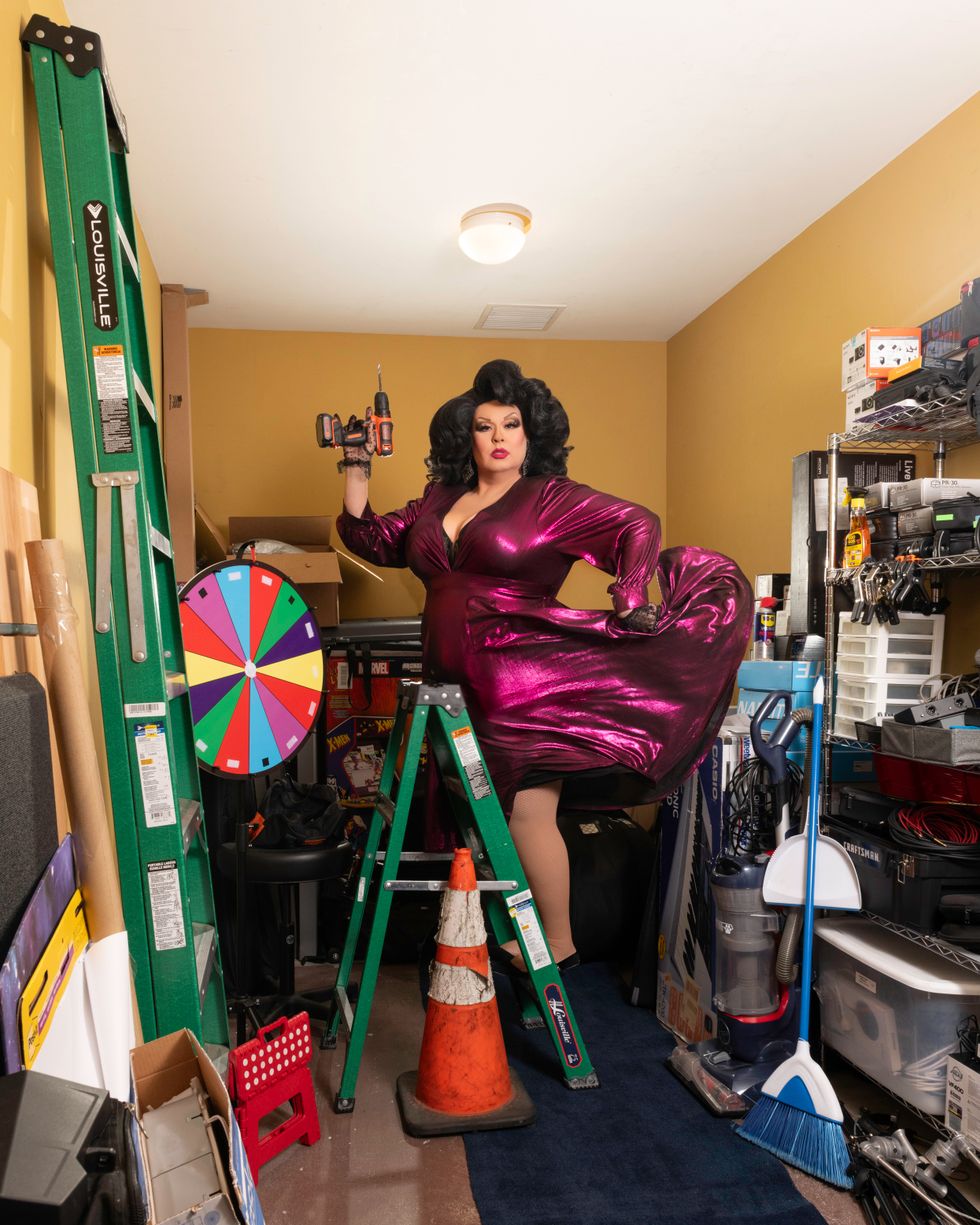
On your podcast, and Very That with Raja before it, you act as a treasure trove of drag knowledge from the before times. “This is what we used to do. This is how we used to do it. We used to make our costumes and these were the queens that were really important to us.” Do you ever feel a responsibility to share that history?
I do. Absolutely. I feel like when I was coming up, even before drag, I liked learning about pop culture things. I can remember like, obviously, like The Elvira Show, and you would be introduced to names, or moments in pop culture, that you wouldn't hear anywhere else. Like, Up All Night with Rhonda Shear, you would hear about these characters. and people would go, “Who is that? What is that?” We didn't have social media to research, so you would just keep referencing the same quote or the same thing over and over. As much as our show is definitely driven by people who love Drag Race, and the quote unquote, big names, we first started with just my friends that were not drag queens, right? I'm going to call my friend who does comedy, and she was like, I'll be there for you! Fast forward to now: she produces, along with drag queens, drag shows at comedy venues. My friend David, who was a real estate agent! I was just like, I need to call my friends that are just talkers that can talk about whatever or everything or nothing. And I feel like they are part of this quilt that, in the future, if somebody goes, oh, did you ever hear about say, this woman who is a stripper, but is also an actress, and is also a single mom, who's known as La Cholita? I wanted a way that archives and catalogs these people that are important around here, even if they're not drag entertainers. I would hope that in a way, we archive it the way I saw Elvira do it, or Rhonda Shear do it, or Sue Johanson, with The Sunday Night Sex Show. I'm not saying I'm those people, but I'm saying that I have an opportunity to at least do that same thing.
I would say that Very Delta, just from an observer standpoint, seems poised to make that happen. That ethos seems shared across the other MOM Podcasts as well.
I think about, like, PAPER. When your emails came through, at first, I said to Big Dipper or someone, “I was in PAPER already.” There's a photograph of me in PAPER, with Adrian Brody on the cover, and it was “A-Z LA.” There's me, and a defunct drag queen for a million reasons, Viva Sex, who was the first drag queen ever to be on The Johnny Carson Show. The issue is so old that Kelly Osbourne was like, the hot deal on the radio. When I look back at a lot of photographs that I have, I'm like, I don't see myself at this club or that club. But then I'm like, wait a minute, in a tiny way, but also a global way, I have a documented magazine that said, this is one of the things that happened in LA 20, 25 years ago. This is what was happening. When this story came up, it felt very full-circle in a way. The issue is about, here’s not just the main players, but these other players that are running around, and I believe, providing the stitch to the main players.
I want to stay on that photo in PAPER. What sort of opportunities, outside of nightlife gigs, were available to drag entertainers?
When I was first doing this, there was no drag brunch. That’s the thing right now, everybody has a brunch gig. Throw a stone without hitting a drag brunch, right? At the time, the way I networked with a lot of people was through an organization that had testing sites for HIV, STDs. They would have consultations, they would have checkups, and they would try to incorporate drag to get people to come. “We're having a drag show on Thursday nights. And while you're here, come visit the van, come get some free condoms, come get some literature.” So that was a thing, and it still kind of is a thing. My friend Psycadella is the person who brought me into that, and she still does outreach in that way. With Psycadella and so many of my friends that mothered or sistered me in a way, we came from a time at the tail end of the HIV crisis. I can still remember being part of that time, and we realized that it would always be your responsibility as a drag entertainer to break off some of that time for charity. Now we have, like, GoFundMe to crowdsource things that you might need. But once upon a time, it was just whatever queens were at the bar. I'm not going to ever forget that.
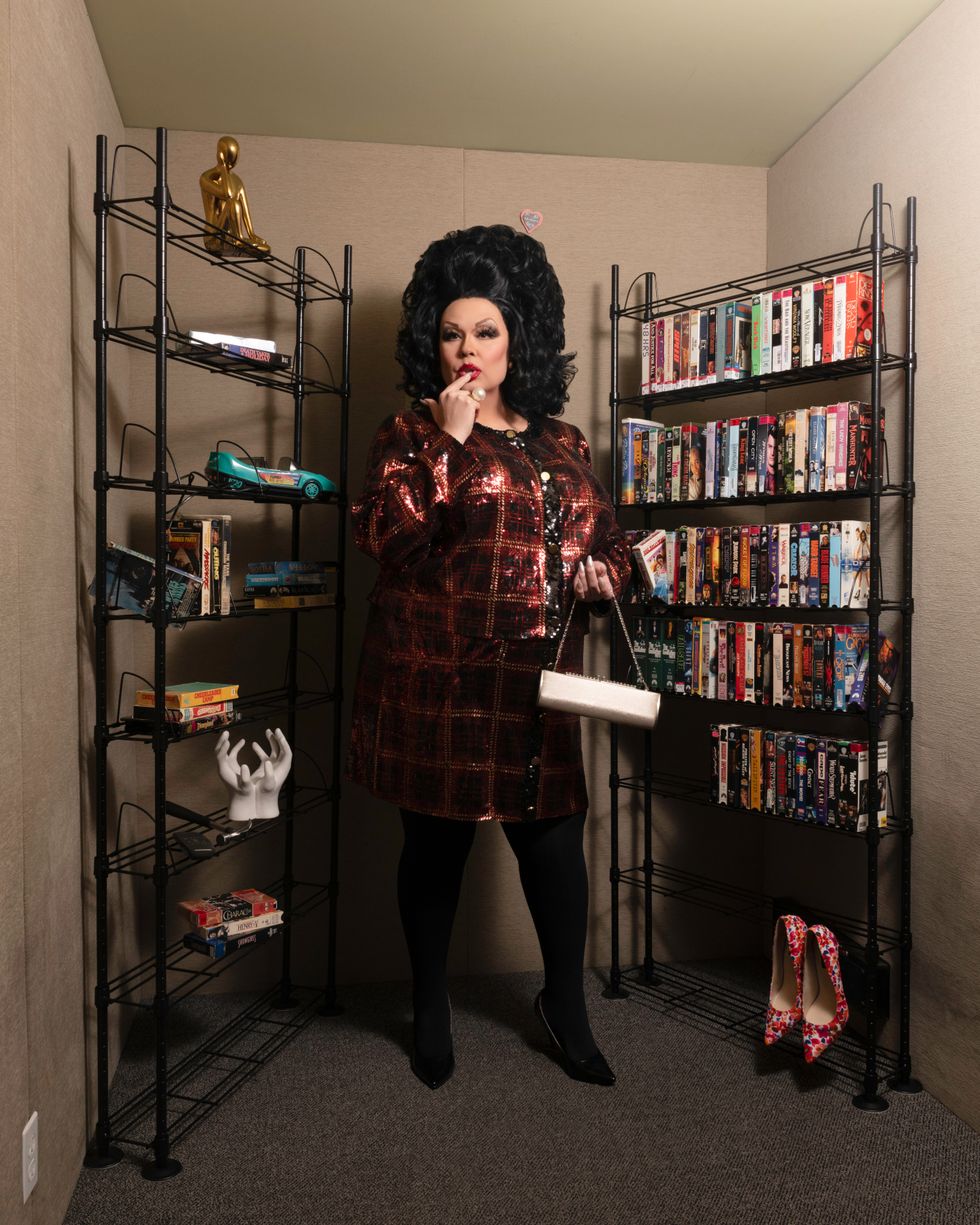
I love when you talk about the gays that come out on a Tuesday, and you’ve said they want to see something cerebral. As a gay that comes out on a Tuesday, can you give us the definitive Delta Work drag mix?
I can definitely tell you what I personally would do. Anything that juxtaposes a well-known character, or something that visually they can visually look at, and go, “That’s Minnie Mouse. That’s the Stay Puft marshmallow man,” or whatever. I haven’t done it in a long time, but I used to do this Minnie Mouse strip tease. The idea is that Minnie’s stripping, but she’s never naked, because she’s entirely covered in fur with a tail. That’s naked for her. So people are like, this is ridiculous, why did you take us here? I try to splice with a movie, or utilize words from them, which a lot of kings and queens do. You just expound upon what they just said with some bizarre lyric that says the same thing, as a fucked up teenager on Maury Povich that’s mad at the audience. You do that at a brunch, they’d be like, “What the hell is going on? Can we hear Taylor Swift?” There’s a place I like to perform called Exposure in Highland Park out here, it’s one of these places that’s in a punk bar that’s mostly straight, but they have a queer event. Everybody that’s there is so fucking on board with whatever is happening, and they get what the references are. If I was to do what I did there for a brunch crowd, they’d be like, no, we need to hear “Bad Girls” by Donna Summer, it has to be simpler.
It seems like Drag Race has exposed these cis, straight people to the art of drag, and trained that audience on what to expect at a drag show.
You’re so right. I think there are people that love drag, and there’s people that love Drag Race. I think people, especially when they’ve only watched a lip sync for your life, say, well, I just watched this drag show and nobody was cartwheeling. That’s not drag performance. I need to see a body fall on the ground, or I need to see wigs pulled off, or I need to see you pointing at your mouth to see all that, or you’re not really performing. That’s why it’s hard for me. There’s so many songs that I want to perform as a lip sync performer, but I feel like people look at me and they’re like, “I don’t see that voice coming from you. That just seems weird.” Right now I absolutely love “yes, and?” by Ariana Grande. The lyrics are really succinct and great. But I feel like people are expecting when that performer comes out to do it, they want a geometric bodysuit with a ponytail with rhinestones on your head. I’m not going to do that, because that’s not what I do! I don’t sell that. Do I want to do the song? Yes. Am I going to figure out how to do it? Probably. But where is it going to fit? I feel like drag fans absolutely watch the race and they’re like, I need to see those shenanigans or you’re not a good performer. I think Morgan McMichaels probably said it during her season, “It’s not a gymnastics competition.”
Some girls could probably hear that now, and come down off the ceiling without any insurance.
Don’t get me wrong, I love watching it. Oh my gosh, I love it. To this day, when I work with Sonique, I’m like, I love watching you. I love watching your awareness of your body and what it can do and your dedication to it. Am I ever going to do it? No, I’m fucking lazy. I’m sitting here drinking this bucket of Diet Coke and it’s 10 o’clock in the morning.
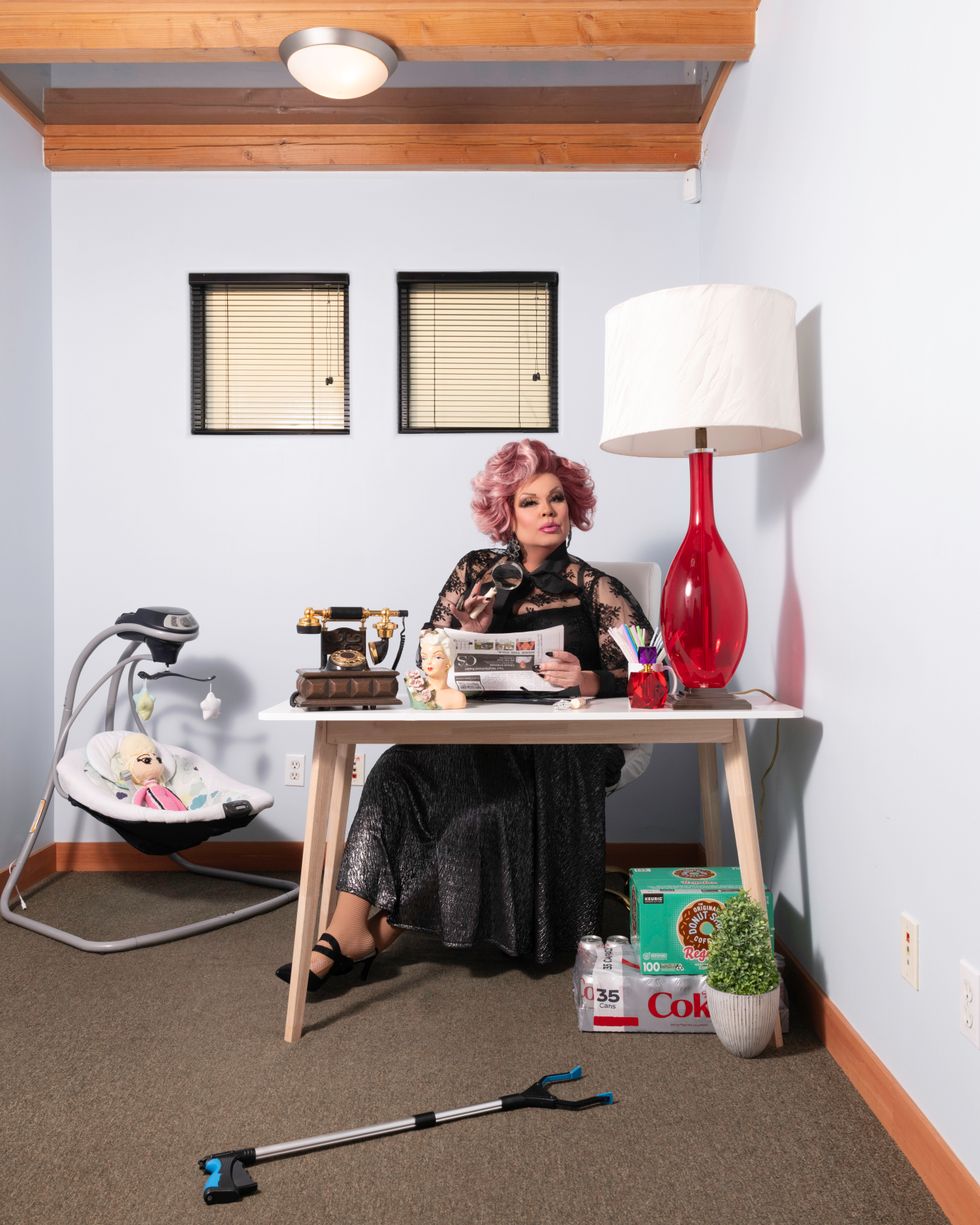
When I first started going to drag shows, it was right when celebrity impersonation, or assassinations, were petering out. Do you ever miss those days when audiences wanted you to do Joan Crawford?
I miss it all the time. I think there's gonna be a renaissance for that coming soon, because I think people are starting to get bored with so many things. Right around now is when everyone kind of knows what's going to play out for the rest of the summer in terms of gigs, and a lot of them are like, “Girl I have, like two gigs. I have one gig. I have no gigs.” The bars are just so oversaturated by it. They’re not even bringing anybody out. They're like, “No, we're good. We don't need it anymore. We're done with that, we're bored with that, we don't have the money for it. People aren't coming out to see it as much anymore.” So who knows? Maybe that could come back. I miss it.
I was talking about this idea of like the 99 Cent store going away, or the Souplantation. I miss when the celebrity impersonation shows were in Vegas. One day, they were just gone. I love that platform of the show. I love what it did. But it makes me miss those two-drink minimum shows, where you could buy a program. You'd go wow, how did they do that all within an hour? Like how? I remember Chad Michaels, LaDonna Monroe, all these people that I’d work with, and would teach me how to underpaint. How to go from this to this, then say, “Oh my gosh, Dolly to Liza is so easy, because you're going to cut the tail off of that, and you're going to put that on.” I miss those shows. Here in LA, people would go to La Cage and have dinner at Carlos and Charlie's.
I love this nightlife history, and so for the history books, is there a club, a venue, a space that you go back to in your mind, from any period of your career?
A couple of them. I definitely go back to Peanuts in my mind, the brick-and-mortar is still there on 7969 Santa Monica. Everyone always said, “Are you going to 7969?” I go back to that place in my mind, just because it didn't have a proper stage. It gave you that weird seediness of the time, because there was no smoking patio, there's no brunch, you smoked on the street, and then you walked inside and did your thing. I remember when we would go on Fridays and Mondays. And that was like trans girl night to go. I don't think it was as divided as it is now. And that is sad to see, and I think the better majority of that does fall on the queer community, dividing that and dividing themselves from the trans community. I think it's fucking shameful, because of how much is appropriated from the trans community. I could go on and that's a whole other subject that just blows my mind.
I also think about this little place that's now a Metro PCS store. It was my very first show I ran, and it was once a month. It was called Stiletto at Encounters in Pasadena. What more gay name for a club is there than Encounters? The claim to fame there was that Robert Reed from Brady Bunch used to go. That was his bar, because he lived out in the San Marino area of Pasadena. I pine for this time! Psycadella would back up her truck to the back door, and we would just get ready in the parking lot. That was also where RuPaul came from time to time.
The MOM Podcasts, through Willam and Alaska, are podcasts by drag queens, with drag queens, that champion drag entertainers and queer people alike. Has it felt empowering for you to work in an environment like that?
I feel like there’s no other place like it. Willam and Alaska, I really believe that they provide this opportunity for many of us, but I think there’s probably a world where, without all of us there, they could probably accomplish more for themselves, and be making more money for themselves, personally. But I think that they see an end game to this, I think they actually literally love providing this opportunity for people. I have never known Alaska to not champion everything in me, and to love me and to want to provide for me. There was a time when forces tried to convince me Willam was the bad person, that Willam was the person that was just so fucked up in the head. I kept saying to myself, I just can’t believe that, because I’m a firm believer in the company you keep. I’m like, why is it that everyone I love absolutely adores that person, but the people that are already causing me to question my sanity are saying the opposite. I had a hard time buying that.
I think that there is a pervasive idea that all kinds of entertainers face: people should be grateful for the opportunity, feel grateful that the powers that be booked them at all. How do you respond to that now, both at this point in your career, but also as drag becomes a commodity that makes a few people millions of dollars?
I remember leaving Drag Race, and thinking, and maybe even saying it on the show or in an interview, that in the queer community specifically, people like to think that fat people should feel lucky that they’re at the table. Once you start espousing something, or start talking about something, it’s like, “Why are you mad? You’re just mad because you don’t fit in. You’re just mad because you’re fat.” They say these things to people they believe have rattled the cage, and need to go back inside. “We already invited you here.” Or, “Why are you talking like that? Why do you take yourself so seriously? You shouldn’t take yourself so seriously, it’s not that big of a deal, I’m just playing with you.”

This comes full-circle to what we talked about in the beginning, with finding your voice. You’ve found this moment to step into your voice, and express yourself on your own terms, and get to be celebrated exactly as you are outside of what people are going to book you for.
I was always a fan of The X-Files. It will always be my favorite thing. I remember there was a quote that always stuck with me, and it was that the most dangerous person is the one who has nothing to lose. I felt like I spent the past 10 years losing out on this gig or that gig because people are like, I don’t know, she’s not really that much of a draw, or this that and the other. I’ve gone places completely uncomfortable, and felt like I didn’t want to say too much, because I was really lucky to be there. If I’m really good, maybe their friend who books people over in Wyoming or wherever, maybe they’ll tell them to book her, she doesn’t really cost much. I’m tired of doing that! Coming back to what you said about full-circle, it does feel like it. I want to go everywhere, I really do.
Photography: Emily Monforte
Editor-in-chief: Justin Moran
Managing editor: Matt Wille
Editorial producer: Angelina Cantú
Story: Joan Summers
Related Articles Around the Web
MORE ON PAPER
ICONOS: Pepe Aguilar, El Oficio del Tiempo, la Voz del Silencio y el Peso del Legado
Español
Jan 19, 2026
Entertainment
Cynthia Erivo in Full Bloom
Photography by David LaChapelle / Story by Joan Summers / Styling by Jason Bolden / Makeup by Joanna Simkim / Nails by Shea Osei
Photography by David LaChapelle / Story by Joan Summers / Styling by Jason Bolden / Makeup by Joanna Simkim / Nails by Shea Osei
01 December
Entertainment
Rami Malek Is Certifiably Unserious
Story by Joan Summers / Photography by Adam Powell
Story by Joan Summers / Photography by Adam Powell
14 November
Music
Janelle Monáe, HalloQueen
Story by Ivan Guzman / Photography by Pol Kurucz/ Styling by Alexandra Mandelkorn/ Hair by Nikki Nelms/ Makeup by Sasha Glasser/ Nails by Juan Alvear/ Set design by Krystall Schott
Story by Ivan Guzman / Photography by Pol Kurucz/ Styling by Alexandra Mandelkorn/ Hair by Nikki Nelms/ Makeup by Sasha Glasser/ Nails by Juan Alvear/ Set design by Krystall Schott
27 October
Music
You Don’t Move Cardi B
Story by Erica Campbell / Photography by Jora Frantzis / Styling by Kollin Carter/ Hair by Tokyo Stylez/ Makeup by Erika LaPearl/ Nails by Coca Nguyen/ Set design by Allegra Peyton
Story by Erica Campbell / Photography by Jora Frantzis / Styling by Kollin Carter/ Hair by Tokyo Stylez/ Makeup by Erika LaPearl/ Nails by Coca Nguyen/ Set design by Allegra Peyton
14 October
Entertainment
Matthew McConaughey Found His Rhythm
Story by Joan Summers / Photography by Greg Swales / Styling by Angelina Cantu / Grooming by Kara Yoshimoto Bua
Story by Joan Summers / Photography by Greg Swales / Styling by Angelina Cantu / Grooming by Kara Yoshimoto Bua
30 September




